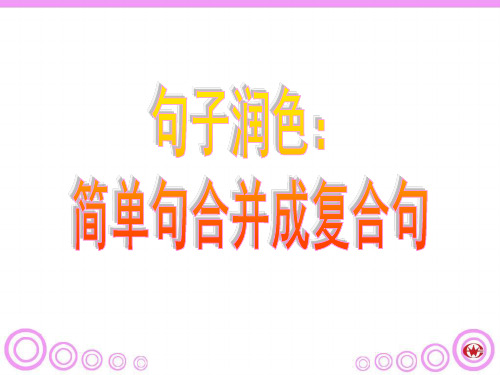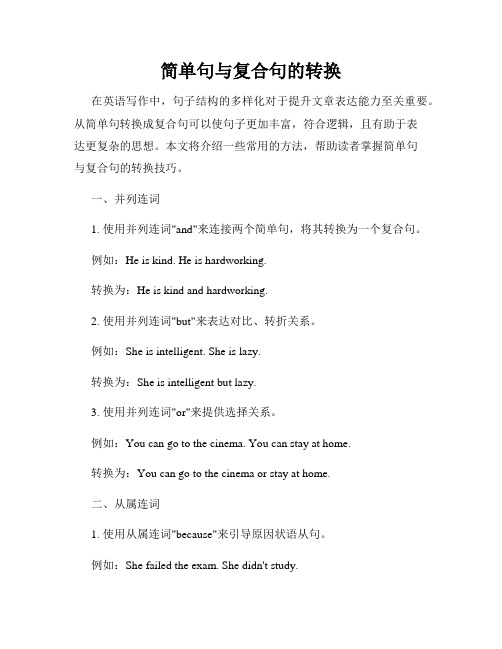简单句和复合句的转换练习
句型转换练习

句型转换练习1. 从简单句到并列句:原句:She is intelligent.转换:She is intelligent, and she is hardworking.2. 从简单句到复合句:原句:He closed the door.转换:After he closed the door, he left the room.3. 从肯定句到否定句:原句:They have finished their work.转换:They have not finished their work.4. 从肯定句到疑问句:原句:They are coming tomorrow.转换:Are they coming tomorrow?5. 从一般疑问句到特殊疑问句:原句:Do you know where the library is?转换:Can you tell me where the library is?6. 从主动语态到被动语态:原句:They built the house last year.转换:The house was built by them last year.7. 从被动语态到主动语态:原句:The book was written by him.转换:He wrote the book.8. 从直接引语到间接引语:原句:"I will do my best," she said.转换:She said that she would do her best.9. 从一般现在时到一般过去时:原句:He plays basketball every weekend.转换:He played basketball every weekend.10. 从一般现在时到一般将来时:原句:I usually go to bed at 10pm.转换:I will go to bed at 10pm.11. 从陈述句到感叹句:原句:I'm so happy to see you!转换:How happy I am to see you!12. 从陈述句到祈使句:原句:You should study harder.转换:Study harder!以上是句型转换练习的一些例子。
单句变复句练习题

单句变复句练习题英语语法中,句子的结构可以通过将简单句变为复合句来丰富,使语言更加生动有趣。
下面是一些单句变复句的练习题,通过掌握不同的变换方式,让我们的句子变得更加多样化。
1. Peter likes playing basketball. He often plays basketball after school.Peter likes playing basketball, so he often plays basketball after school.2. The traffic was heavy. We arrived late for the meeting.Due to the heavy traffic, we arrived late for the meeting.3. She studied hard. She passed the exam.As she studied hard, she passed the exam.4. Tom didn't have any money. He couldn't buy the book.Since Tom didn't have any money, he couldn't buy the book.5. Mary went to the supermarket. She bought some fruits and vegetables.Mary went to the supermarket and bought some fruits and vegetables.6. It was raining heavily. The football match was canceled.Because it was raining heavily, the football match was canceled.7. Jack is a doctor. He works in a hospital.Jack, who is a doctor, works in a hospital.8. They missed the train. They had to wait for the next one.Having missed the train, they had to wait for the next one.9. The sun was shining. The birds were singing.With the sun shining, the birds were singing.10. The dog barked loudly. The cat ran away.On hearing the dog bark loudly, the cat ran away.11. They were tired. They decided to take a rest.Feeling tired, they decided to take a rest.12. John cooked dinner. His wife cleaned the house.While John cooked dinner, his wife cleaned the house.以上是一些单句变复句的练习题。
简单句和复合句之间的转换 1

复合句和简单句的转换(一)1. 用“宾语+宾补”来代替“宾语从句”。
例句: I found him very happy. 我发现他很快乐。
I found (that) he was very happy. 我发现他很快乐。
2. 用“疑问词+动词不定式”来代替“宾语从句”。
例句: I don't know what I will do tomorrow.我不知道我明天会干什么。
I don't know what to do tomorrow.我不知道明天千什么。
注意:why 是不能和不定式连用的。
“疑问词+动词不定式”来代替“宾语从句”这种简化的前提是宾语从句的主语和主句的主语相同,且主句的谓语动词通常是know, remember, forget ,learn 等。
3. 用“动词不定式”来代替一些结果状语从句或者目的状语从句。
例句:He must get up early so that he can catch the first bus.他必须早起以便他能赶上第一班公交。
He must get up early to catch the first bus.他必须早起以赶上第一班公交。
习题1. I think ___ necessary to learn English well.A. itsB. itC. thatD. that is2. You can’t have the horse _____ all the way. It’s too hot.A. runB. to runC. runsD. to be running3. When I came back, I found the house _____ and everything _____.A. was broken; took awayB. broken into; taken awayC. had been broken; takenD. break into; take away4. When I came back, I found nobody ___. It was empty.A. onB. outC. inD. away5. Tell him _____ the window.A. to shut notB. not to shutC. to not shutD. not shut6. ----The re’s a hole in your bag. ---- I know, I’m going to have it _____.A. mendB. mendingC. mendedD. to be mended7. I found the door _____ when I got home.A. openedB. closeC. unlockingD. open8. There i sn’t any difference between the two. I really don’t know _________.A. where to chooseB. which to chooseC. to choose whatD. to choose which9. “ Have you d ecided when ________?” “ Yes, tomorrow morning.”A. to leaveB. to be leavingC. will you leaveD. are you leaving10. ________, you need to try your best to practise.A. Being a winnerB. To be a winnerC. Be a winnerD. Having been a winner11. A car accident happened there. An old woman . But the car drove away.A. knocked overB. was knocked overC. knocks overD. is knockedover12. When I came in, I saw her the piano.A. playB. playingC. playedD. toplay13. The dog I saw just now is Mike’s.A. whoB. thatC. whenD. where14. His children work far away from here, and he has nobody to talk to all day long, so he often feels .A. happyB. lazyC. tiredD.lonely15. —Do you know to go to Mount Tai by train with them?—At 7 tomorrow morning.A. whereB. howC. whyD. when1 The news (扩散) in the school yesterday.2 The room is in a (乱七八糟). Clean it up now.3 Don’t repeat what I’v e told you to anyone; it’s(私密的).4 There are two (文件) on the table.5 The road is too narrow for my car to go (通过).6 My bike is a home (production).7 —Is he coming tomorrow?—I’m(sure), but you can ask himself.8 It makes everything else go more (smooth)9 They did not (proper) consider what would happen next.10 This machine was (complete) out ofcontrol.11 You (fine) by the police if you break the traffic rules.12 (limit) the number of cars is a useful way to reduce air pollution.13Jack (dig) a hole in the garden when I went to see him.14 How often the Olympic Games (take) place?15 Do you know how much paper (waste) last year?。
英语中复合句与简单句的转换举例

英语中复合句与简单句的转换举例1. 含宾语从句的复合句转换为简单句。
即将宾语从句转换成相应的短语:We expected that you would come. 我们希望你来。
→We expected you to come. 我们希望你来。
Now tell me what I should do. 现在告诉我该怎么办。
→Now tell me what to do. 现在告诉我该怎么办。
I remember I once met her at a party. 我记得在一次晚会上见过他。
→I remember once meeting her at a party. 我记得在一次晚会上见过他。
I ask him what I shall do. 我问他该怎么办。
→I ask him what to do. 我问他该怎么办。
I can't decide whom I should invite. 我不能决定该邀请谁。
→I can't decide whom to invite. 我不能决定该邀请谁。
2. 含状语从句的复合句转换成简单句。
即将状语从句转换成状语短语:He can't come because he is ill. 他因病不能来。
→He can't come because of his illness. 他因病不能来。
Turn off the light before you leave. 离开前请关灯。
→Turn off the light before leaving. 离开前请关灯。
He went home after he finished his work. 他做完工作后就回家了。
→He went home after finishing his work. 他做完工作后就回家了。
He was so angry that he couldn't speak. 他气得话都说不出来。
简单句变复合句

⑵ You must hurry. You’ll miss the plane.
→You must hurry or you’ll miss the plane.
⑶ Honey is sweet. The bee stings. →Honey is sweet but the bee
stings.
有时为了使句子的连贯性更强表达也更为贴切自然我们在两个或者多个简单句之间加上andbutor或者否否则则for因为while而却when就在这个时候notonly
有时为了使句子的连贯性更强, 表达 也更为贴切、自然, 我们在两个或者多 个简单句之间加上and, but, or(或者, 否 则), for (因为), while(而, 却), when(就在 这个时候), not only ...but also等并列连 词, 使其成为并列复合句。如:
another object in space. ⑶ A satellite is either natural or man-
made.
3. A satellite is an object, either natural or man-made, which travels in an orbit round another object in space.
2. Our teacher must be at home. The door is open. 2. Our teacher must be at home, for the door is open.
简单句与复合句的转换

简单句与复合句的转换在英语写作中,句子结构的多样化对于提升文章表达能力至关重要。
从简单句转换成复合句可以使句子更加丰富,符合逻辑,且有助于表达更复杂的思想。
本文将介绍一些常用的方法,帮助读者掌握简单句与复合句的转换技巧。
一、并列连词1. 使用并列连词"and"来连接两个简单句,将其转换为一个复合句。
例如:He is kind. He is hardworking.转换为:He is kind and hardworking.2. 使用并列连词"but"来表达对比、转折关系。
例如:She is intelligent. She is lazy.转换为:She is intelligent but lazy.3. 使用并列连词"or"来提供选择关系。
例如:You can go to the cinema. You can stay at home.转换为:You can go to the cinema or stay at home.二、从属连词1. 使用从属连词"because"来引导原因状语从句。
例如:She failed the exam. She didn't study.转换为:She failed the exam because she didn't study.2. 使用从属连词"if"来引导条件状语从句。
例如:He will come. It doesn't rain.转换为:He will come if it doesn't rain.3. 使用从属连词"when"来引导时间状语从句。
例如:I will call you. I finish my work.转换为:I will call you when I finish my work.三、使用关系代词1. 使用关系代词"who"、"which"和"that"引导定语从句。
英语简单句+复合句 翻译练习 用教学教材

英语简单句+复合句翻译练习用英语简单句翻译练习1.由于大火的结果,成千上万的人失去了家园。
2.学生们一路上不停地说笑。
3.我妈妈叫我做作业,而不是洗碗。
4.在公共场合,不允许人们吸烟。
5.昨天下午我妈在那家商店给我买了橡皮、小刀和铅笔盒等。
6.我英语发音方面有些困难。
7.祝你在深圳玩得愉快。
8.这顶帽子是由手工而不是机器做的。
9.明天晚上我要到机场去送我姨妈。
10.所有的学生都必须遵守校规。
11.事实上,我非常喜欢学英语。
12.有时,英语口语完全不同于英语书面语。
13.我们学校图书馆将为学生们提供各种类型的书。
14.下一年我的家乡将建一所新医院。
15.许多人在这次车祸中丧生,仅有少数幸运者没有受伤。
16.玉米最先在美国种植。
17.飞机比火车重20倍。
18.每人只允许从图书馆借两本书。
19. 吃新鲜的蔬菜和水果对你的健康很有益。
20.由于老师的帮助,他考上了一所名牌学校。
21.我每隔两天(每三天)去那里一趟。
复合句的翻译练习1.当你离开教室时,务必关灯。
2.你一旦开始,就必须进行下去。
3.如果你不快点,你就会误了火车。
4.这个男孩说他曾经和一位美国人讲过英语。
5.老师告诉我们英国英语与美国英语拼写方面有些不同。
6.如果今天下午下雨的话,我就乘出租车去上学。
7.为了赶上头班车我明天得起得早点。
8.科学家担心有一天一次更大的地震会袭击这座城市。
9.建于1960年的那栋房子在这次地震中巍然屹立。
10.研究地震的人们认为把房子建在沙地上是不安全的。
11.去年地震时,失去家园的人数多达5千。
12.正站在我们教室前面的那位女士是我们的英语老师。
13.在西方国家人人都喜欢牛奶作成的奶酪。
14.当你说英语时,必须让别人听懂。
15.你认为他来回答这些问题很难吗?16.据报道在那个地区又建了一所新学校。
17.她出生的那个村庄很美。
18.借走我自行车的那个人叫Paul。
20.你最好带把伞,以防万一下雨。
简单句,复合句,并列句

简单句,复合句,并列句xxxxxxxx中学221611通过简单句,复合句,并列句之间的相互转换能够使学习者温故知新,在准确理解的基础上牢固掌握并灵活应用各种复杂的句型。
英语中各种句型间的相互转换常见以下几类:一、简单句←→复合句1、表示动作意义的名词、动名词短语或起名词的作用的不定式短语有时与名词性从句可以互相转变。
例如:His sudden deathmade us sad.←→That he suddenly diedmade us very sad.His words deeply upset me.←→what he said deeply upset me.The president’s attending the meeting himselfgave them a great deal of encouragement.←→It gave them a great deal of encouragement that the pr esident attended the meeting himself.What worried the child was his not being allowed to visit his mother in the hospital.←→What worried the child was that he was not allowed to visit his mother in the hospital.Our intention was to help you.←→Our inten tion was that we should help you.I still rember being / having been taken to Beijing when I was a child.→I still rember (that) I was taken to Beijing when I was a child.I'm sure of his failure.←→I'm sure (<of the fact> that) he will fail.2、某些动词的复合宾语——宾语+宾语补足语,与宾语从句可以相互转变。
- 1、下载文档前请自行甄别文档内容的完整性,平台不提供额外的编辑、内容补充、找答案等附加服务。
- 2、"仅部分预览"的文档,不可在线预览部分如存在完整性等问题,可反馈申请退款(可完整预览的文档不适用该条件!)。
- 3、如文档侵犯您的权益,请联系客服反馈,我们会尽快为您处理(人工客服工作时间:9:00-18:30)。
1. Neil Armstrong received his student pilot's licence when he was 16.
= Neil Armstrong received his student pilot's licence
16.
2. He graduated from college at the age of 22.
= He graduated from college .
3. He went home after he finished his homework.
= He went home after .
4. He didn't join in the party because it rained heavily last night.
= He didn't join in the party
last night.
5. We can't believe him because of his careless behavior.
= We can't believe him .
6. Fish can't live if there is no water.
= Fish can't live .
7. The students can't go on a school trip without their parents' permission (允许). = The students can't go on a school trip their parents
them .
8. I get up early so that I can get the early bus to school.
= I get up early get the early bus to school.
9. Mr. Black is so careful that everybody wants him to be the manager.
= Mr. Black is the manager in everybody's eyes.
10. Jack is so rude that everybody dislikes him.
= Jack is by everybody.
11. The crosses on her paper reminds me that she is careless.
= The crosses on her paper reminds me .
12. I'm sure that he will be succeed.
= I'm sure about .
13. Our president is certain about the rapid increase in our population in 10
years.
= Our headmaster is certain our population
in 10 years.
14. Are you aware of the distance between Mars and the earth?
= Are you aware Mars is away from the earth?
15. I don't know which one I can buy.
= I don't know which one .
16. I heard that she was reading English aloud in the classroom.
= I heard English aloud in the classroom.
17. Do you understand what I said.
= Do you understand .
18. He may buy a house which has a big garden.
= He may buy a house .
19. That girl who wears a red dress is my sister.
= That girl is my sister.。
